#Deaf Poets Society
Explore tagged Tumblr posts
Text
In Dead Poets Society, when the gun shot goes off, the sound is cut and we see Neil's father wake up. He's the only person that heard it.
If a tree falls in a forest with nobody around, did it even make a sound?
Neil's father was never willing to listen to Neil. His insistence that Neil follow a path he didn't want led to Neil's final decision.
If a tree falls in a forest and the only person around is deaf, did it even make a sound?
355 notes
·
View notes
Text
“secret admirer” - dead poets society (final)
summary: y/n confronts their poet (lightly inspired by this post)
pairing: (not-so) anonymous!dead poet x reader
word count: 536
previous
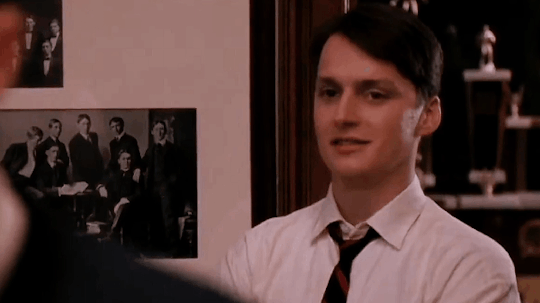
Y/N felt like they were having an out of body experience—maybe they were dreaming? That seemed like the most reasonable explanation for a night like that.
They kept waiting for the moment where they shot awake in their dorm room, but it had yet to come.
No, this was real, and it was more beautiful than they ever could have imagined.
It was also over much faster than they would have liked. Y/N and Charlie bounced glances back and forth all throughout Neil’s monologue and the following final words from the poets. They were the last two to exit the cave.
Y/N spoke up once there was some distance between them and the rest of the poets, “So it was you this entire time?”
“That it was,” Charlie grinned as he shoved his hands in his pockets.
“God, you’re so annoying.”
“What?” Charlie laughed out.
“It’s such a you move to be waxing poetic to me in secret while being an absolute terror in person.”
“Well, I had to get through to you somehow.”
Y/N was having a difficult time being annoyed at the grinning boy.
“You could have tried talking to me like a normal person—you know, the old-fashioned way of doing things.”
“I thought this was the old-fashioned way?” the grin still hadn’t left Charlie’s face, and the light look in his eyes made Y/N’s stomach flutter, “Besides, you wouldn’t have had any of it.”
“Who said I’m having any of it now?”
“Well, you’re here, and you’re actually having a conversation with me without trying to run in the opposite direction,” he stopped walking and faced Y/N, “I’d say that’s a start.”
“Maybe so,” Y/N shrugged and couldn’t help the smile spreading across their face.
Charlie’s features softened, “I liked your poem, by the way…not as good as mine, but it’s the thought that counts.”
“You’re insufferable,” Y/N laughed.
“But you’re suffering me anyway.”
The pair stood in silence for a beat, exchanging soft smiles and savoring the moment.
“So, where do we go from here,” Y/N inquired, “what’s your master plan, Romeo?”
“We go out on a couple dates, get married, grow old together—you know, the usual.”
Y/N rolled their eyes as their cheeks flushed, “would it kill you to be serious for five seconds?”
“Maybe,” Charlie grinned as he entwined his hand in Y/N’s, “I’d really like to kiss you.”
“Then kiss me, Dalton.”
And so he did, and it was perfect.
That is, until the cheering and wolf whistles began from up ahead.
Y/N was impossibly red as Charlie pulled them along with him back to the poets, a mixture of pride and adoration on his face as he looked at them.
“Really, Dalton? We leave you alone with an individual for one minute and you’re already putting the moves on them?” Knox teased the boy.
“Long con, boys,” Charlie wrapped his arm around Y/N’s shoulders, “works every time.”
“Have I mentioned that you’re insufferable?”
Charlie just smirked and leaned in for another short kiss. Sounds of mock disgust fell upon deaf ears.
Meeks was right, Y/N thought, this night really did wonders for my spirit.
~~~
a/n: keeping it short and sweet for the finale—thanks for all the love on this story <3
taglist: @vvnbxz @edb954 @coralineyouareinterribledanger @ashisabitgay
#dead poets society#dead poets society x reader#dps boys#dps#dps x reader#todd anderson#neil perry#steven meeks#gerard pitts#charlie dalton#knox overstreet#todd anderson x reader#neil perry x reader#steven meeks x reader#gerard pitts x reader#charlie dalton x reader#knox overstreet x reader#dps fandom#dead poets fandom#dps fanfiction
787 notes
·
View notes
Text
I have been meticulously reading an immense amount of wolfstar fics since 2021, so I'll give y'all my humble opinion on the best fics I've read, from the popular to the non popular ones:
WOLFSTAR FICS RECOMMENDATIONS ON AO3
POPULAR ONES THAT YOU MIGHT HAVE ALREADY HEAR OF:
"Best Friend's Brother" by bizarrestars (there's jegulus in this one as well. Remus is Regulus' best friend, and James is Sirius'. Regulus and Sirius don't talk anymore)
"Crimson Rivers" by bizarrestars (Hunger Games au. heart breaking. you will cry for months. there's also jegulus, dorlene, and marylily).
"The Cadence of Part-time Poets" by motswolo (High-school plus band au. my pearsonal favorite. I love it)
"Kill Your Darlings" by MesserMoon (Deaf Remus. College. other couples povs like jegulus and marylily. I cried so much. haven't recovered)
"Dear Your Holiness" by MollyMaryMarie (priest Remus. I know, it's weird, give it a chance anyway)
"all my cards are here" by haey1 (band au)
"Not Another Band AU" by TheLovelyZee (band au. I really love band au's)
"Sweater Weather" by lumosinlove (hockey au. Sirius is the captain, Remus is the physical trainer)
NON POPULAR ONE'S (some of it might be popular and I'm just not aware):
"Staying Strangers" by 3amAndCounting (texting. IT'S SO AMAZING. they actually talk about stuff before running away when they're sad, I'm obsessed)
"oh thou, my lovely boy" by bigthief (Dead Poets Society au)
"Blends" by rvltn909 (coffee shop au)
"A Wolf's Heart" by mizdiz (ill Remus. I cried. a lot.)
"cruel summer" by moonystarx (girl__almighty) (teenargers spending the summer toguether)
"Of Memories and Milk Thievery" by moonymoment (divorced wolfstar raising Teddy)
"Show Me Love" by EtoilesLaNuit (a one-shot of a universe where wolfstar didn't work out and everything falls apart. I sobbed reading this. If you feel like crying, this is your fic. If you're looking for a happy ending, run away from here)
"labyrinth" by moonymoment (they have a past, but now Remus is back, and Sirius doesn't know what to do)
"sirius black and the "mystery girl"" by tjmcharg (lily tries to figure out who is this person sirius is dating. Hogwarts au)
"every christmas from now on" by mandarino_o (fake dating. they're so obvious. im in love)
"Godlight" by Badhairred (F1 DRIVERS!!!! wolfstar and jegulus. they hate each other at first)
"Best Friend's Wedding" by amberlink (fake dating. famous sirius. remus works for him. past romantic prongsfoot)
"saccharine" by moonymoment (GHOST SIRIUS!!!)
This is it everybody, these are the main ones for me. enjoy and thank me later (:
#wolfstar#marauders#I have a lot of free time#my favorite wolfstar fics#wolfstar fanfiction#fanfic reccomendation#fanfic rec#remus lupin#sirius black#remus x sirius#sirius x remus#I LOVE THEM SO MUCH OMG
80 notes
·
View notes
Text
Casual Viewer Canon: The movie's mainstream theatrical release without the deleted scenes. (The dark-haired girl playing Hermia...exists, kinda, maybe. These events took place in the autumn and winter of 1959.)
Deep Lore Canon: The movie, deleted scenes, and the book. (Chet has a sister named Ginny who goes to Henley Hall. Neil Perry self-injures. Todd told Neil about his dad nicknaming him $5.98 and got to read aloud his "And Still We Sleep" poem, etc.)
Questionmark Canon: Meeks died in 'Nam, AnderPerry readings argued coherently by sociologist and academic Alexander Avila, the cast knew that AnderPerry might've been dating but took it in stride and were not (or would not have been) homophobic, These events took place in 1989 instead of 1959, etcetera.
Fanlore: More than one person has the same headcanon and a handful of people have at least heard of it—French Todd Anderson, Neil Perry survives and lives in New York City, These events took place in an alternate universe pandemic-free 2020 thereabouts or whatever, etcetera.
Headcanon: Neat ideas about the characters and settings that aren't any sort of Canon or even Fanlore but can still be interesting.
Maybe it's just me and my musical theater fandoms with cast changes and various directorial decisions and adaptations from movies and books are always adding and changing what the thing is, but...I thought everybody decided for themselves what was and wasn't canon about a thing?
the DPS canon is so confusing to me. Like, what's considered canon? Logically, the movie, because it came first. But what about the deleted scenes? Are those canon? If not, then Ginny just...doesn't exist? And if they are, then the book could be considered canon too, because it has all the deleted scenes. But the book is also the script before all the rewrites and ad-libs. There's a part where Charlie "no thoughts empty brain" Dalton asks if math can be considered poetry. CHARLIE! There's a part where Neil stabs himself with a pin. Do we consider that canon? The book also doesn't have a flying desk set, because that's something Ethan and Robert came up with on set. No snow scene, either.
anyway my head hurts
#dead poets society#AnderPerry is canon in the TikTok musical adaptation#Dmitri from Anastasia watched his father die in a labor camp they didn't show that in the cartoon movie by Don Bluth#(and instead of an undead evil wizard it's Comrade Gleb who's the baddie; i LIKE evil wizard as a character but c'mon...Comrade Gleb...)#Moritz Stiefel from Spring Awakening was doing badly at school because The Milan Conference banned Sign Language worldwide and he's Deaf.
414 notes
·
View notes
Text
Monster Spotlight: Choral

CR 6
Neutral Good Small Outsider
Bestiary 5, pg. 23 (pic taken from 2e’s Bestiary 1, pg. 17)
Created from the souls of poets, songwriters, musicians, and bards of every sort, these glorious angels are the answer to the question of “where is that holy, vaguely-Latin orchestral music coming from?” whenever especially powerful celestial beings appear. Responsible for providing the background music to every upper plane, Choral Angels tend to remain in those planes for the majority of their existence, composing new songs and ballads to all that is Good. Occasionally, their superiors will ask them to deliver messages to the mortal flocks in their care, a task they do with as much pomp and presentation as one could ask for; subtlety isn’t their strong suit... unless they spot fellow musicians in distress. While this practice isn’t always authorized, the Choral Angels rarely care for dealing with red tape and will descend from the upper planes to provide musical inspiration to unfortunate creatives who’ve been abandoned by their muses and are falling into despair because of it. Sometimes, they even fall in love. And that’s where Aasimar Bards come from!
Like all angels, Choral possess a suit of restorative spells available to them, including Dispel Evil, Remove Curse, and Remove Disease at will, making them boons for any society that hosts one. Because they occupy a relatively low rung on the celestial ladder, Choral Angels can usually get away with sneaking off to aid those in need of their talents and provide much-needed morale where it’s at its lowest. These facts combined mean the generous beings can sometimes end up living among mortals as healers and musicians for years, though their penchant for song means they tend not to be the best at keeping their heads down when Evil is afoot.
Given their small size (literally Small, something I hadn’t noticed until I wrote it down!), relatively low importance in the halls of Good, and relatively harmless appearance, any fiend or vile mortal may believe that these creatures to be easy prey... And, for the most part, they’re right! IF, and only if, the attacker can get them to land, because if a Choral takes to the air, they can fight back with a staggering amount of destructive power for their size. I don’t mean physical power, mind, because a Choral in melee is absolutely pathetic, having only a 1d3+1 slam attack. What I mean is their primary offensive measure: Piercing Hymn.
This note of divine destruction is a ranged touch attack with a 90ft range that’s so damn loud anyone struck by it must succeed a DC 17 Fortitude save or be rendered deaf for minutes at a time, but more importantly it deals 4d6 Sonic damage. With a Fly speed of 60ft and 0 melee power, there’s no reason for a Choral to ever not spend its turn getting as high above a foe as they can and blasting them to pieces with holy hymns. Their Protective Aura is especially useful in helping them maintain their dangerous distance, because if for whatever reason some fiend, or even the party, needs to fight them at an appropriate level of 4~6... well, suddenly immunity to 3rd level or lower spells goes from a nuisance to encounter defining. Hope you have someone in your party with good ranged attacks!
As Heaven’s bards, you may expect the Choral to possess some bardic talent, but you’re only partially right. They do have Countersong to drown out hostile noises and a 3/day Sculpt Sound to cause diversions and silence allied movements, but their real power lies in the terror that’s unleashed if Chorals form a chorus. Able to Harmonize with one another to join their divine voices into a myriad of holy sounds, their abilities become more potent and dangerous the more Chorals spend their swift action to join in the song: two Choral working in tandem can cast Calm Emotions and Heroism at will to bolster those in their care while Harmonizing, four can use Shout to blast cones of powerful Sonic energy outwards, while an ensemble of six Choral can generate Greater Heroism for their allies and Holy Word for their enemies.
It serves as a fun lesson, I think. Even the most harmless and gentle agent of Heaven can split eardrums, turn a cadre of peasants into a heroic army, and obliterate an entire swath of villainous forces with song alone... if they work together.
You can read more about them here.
167 notes
·
View notes
Text
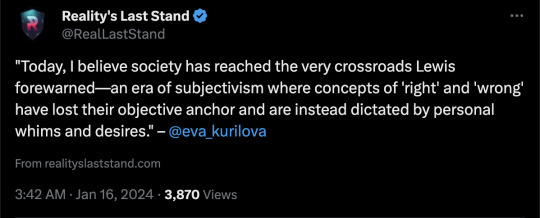
By: Eva Kurilova
Published: Jan 15, 2024
In 1943, C.S. Lewis delivered a series of lectures at King’s College that warned about the erosion of moral values and the rise of relativism, which he believed would lead to humanity’s ruin. These thought-provoking lectures were later compiled into The Abolition of Man, a book that has since been acknowledged as one of the most significant and influential works of the 20th century.
Today, I believe society has reached the very crossroads Lewis forewarned—an era of subjectivism where concepts of “right” and “wrong” have lost their objective anchor and are instead dictated by personal whims and desires. A striking manifestation of this shift is evident in the construction of an oppression hierarchy. This hierarchy asserts that moral judgements in any given situation is not determined by external, consistent values for judging behavior, but rather by the fluctuating perceptions of who is deemed “privileged” and who is deemed “oppressed.”
In his lectures, Lewis emphasized the importance of universal virtues in guiding our morality. He referred to these virtues, which he believed to be found universally across humanity, as the “Tao.” Originating from Chinese philosophy, the Tao represents a way of life in harmony with the world. Discerning the right way to live, according to Lewis, requires wisdom and character. He describes the Tao as “the doctrine of objective value, the belief that certain attitudes are really true, and others really false, to the kind of thing the universe is and the kind of things we are.”
Regrettably, Lewis observed a decline in such wisdom and integrity among the youth of his era, leading to what he termed “men without chests”—individuals devoid of honor and virtue. His critique was not about dictating the specifics of what is “right,” “moral,” and “good.” Rather, Lewis lamented that we have lost any sense that the right, moral, and good exist at all, writing: “Until quite modern times all teachers and even all men believed the universe to be such that certain emotional reactions on our part could be either congruous or incongruous to it.”
To illustrate his point, Lewis began his first lecture with an anecdote about the English poet Samuel Coleridge. Coleridge was once gazing at his favorite waterfall when two tourists came along, one calling the waterfall “sublime” and the other as merely “pretty.” Coleridge approved the former judgment and rejected the latter.
Lewis’ intention was not to dictate perceptions of waterfalls. His concern was that, when the story was referenced in a “little book on English” for schoolchildren that he called The Green Book, the authors declared that the tourist who called the waterfall “sublime” was merely making a statement about his own feelings. This, according to Lewis, exemplified a troubling shift away from recognizing objective beauty and value.
This sly inward turn toward subjectivity, and away from the belief that certain emotional responses can be congruous or incongruous with reality, deeply troubled Lewis. He feared this trend would lead to “men without chests.” He posited that we would demand from such men qualities like drive and self-sacrifice while relegating virtues like honor and patriotism to mere feeling and opinion. He uses the example of a Roman father telling his son that it is a “sweet and seemly thing to die for his country.” The authors of The Green Book, however, would feel the need to debunk this sentiment the same way they debunked the idea that the sublime nature of the waterfall has any reality outside of the tourist’s own feelings.
Lewis further illustrated his point using a humorous example of himself and his attitude toward children. He admitted, “I myself do not enjoy the society of small children: because I speak from within the Tao I recognize this as a defect in myself��just as a man may have to recognize that he is tone deaf or colour blind.”
Rather than trying to justify the fact that he doesn’t enjoy the company of children by forcing the rest of society to see it as a virtue, Lewis acknowledged it as a personal shortcoming, recognizing that we should value spending time with children. However, it often seems today that people do the opposite: they argue that what they personally like is valuable and what they personally dislike is not. And this is exactly what Lewis saw coming.
When we move away from the Tao and the idea that certain attitudes toward the world are really true and good, we risk evaluating the world solely through the lens of desire and emotional impulses. “When all that says ‘It is good’ has been debunked,” says Lewis, “what says ‘I want’ remains.” He further remarks: “Those who stand outside all judgements of value cannot have any ground for preferring one of their own impulses to another except the emotional strength of that impulse.”
I believe Lewis correctly predicted humanity’s moral trajectory, which is highly concerning considering where he said it would lead. What I don’t think he could have predicted, however, was that one of the major ways that subjective and relativistic morality would manifest was through the oppression hierarchy.
Based on identity characteristics like race, sex, sexuality, and “gender identity,” the oppression hierarchy slots individuals into a stack that ranges from most privileged to most oppressed. At the top, you will invariably find “cis” straight white men. At the bottom, you will likely find black “trans” women, often bearing additional marginalized identities like “disabled.”
The morality underpinning this hierarchy is inherently relativistic. It contends that those lower in the stack are incapable of wrongdoing toward those above. For example, you might have heard that non-white people can’t be racist against white people because they are more oppressed as a group on the basis of race. It is also reflected in the idea that there is no such thing as misandry because under patriarchy men as a class oppress women as a class. This ideology further manifests in attitudes that trivialize or even endorse acts like shoplifting, justified by the belief that capitalism is an “oppressive” system.
Gone is the traditional notion of treating others equally and recognizing antisocial behaviors like theft as inherently wrong. According to this new moral framework, any attitude or action directed against an “oppressor”–be it an individual or a system–is deemed justifiable.
This new morality and its value calculus is also prevalent in contemporary gender ideology. It becomes particularly apparent in how trans-identifying individuals demand privileges that clash with the rights of women. Gender self-identification is a disaster for women’s sports, women’s prisons, and women’s private spaces, but it doesn’t matter because “trans” people are considered oppressed, and “cis” people the oppressors. As a result, trans-identified men can therefore demand anything at the expense of women’s rights, and women who refuse or fail to swiftly comply with every demand are branded as hateful.
Oppression stack-based morality is why trans rights activists feel entitled to call for violence, rape, and death against so-called “transphobes” who disagree with them, and why they receive no real pushback from within their communities. It’s why they feel emboldened enough to hold up signs that say “decapitate TERFs” and to show up at women’s rights events with fake guillotines. It’s why they regularly jump to the defense of male pedophiles, rapists, and murderers who seek transfer to women’s prisons. Critics of such transfers are often accused of bigotry and “misgendering.”
No matter what, the “trans” person in any scenario is viewed as inherently oppressed and incapable of wrongdoing, especially against those deemed as oppressors.
A case in point is Audrey Hale, a mass shooter who killed three adults and three nine-year-old children at a private Christian school in Tennessee. Because she identified as a transgender man, activists quickly slammed media outlets for “misgendering” Hale by referring to her using female pronouns. CNN and The New York Times even issued “corrections,” essentially capitulating to the preferences of a mass child killer. Prominent transgender activist Eli Erlick even called the school a “right-wing institution” and asserted, without evidence, that Hale had been “abused” there.
However, perhaps the most striking illustration of this new morality at play was seen in the response to the Hamas terror attack against Israel on October 7, 2023. Despite the heinous nature of the atrocities committed on that day, a disturbing number of people praised the actions of the terrorists. The moral calculus has been grim. The terrorists were rebranded as oppressed freedom fighters. Consequently, their actions, regardless of how morally reprehensible, were often rationalized or justified because they were perceived as acts against “oppressors.” In this context, the conventional condemnation of acts like mass rape and murder has become contingent on the relative privilege of the perpetrator and the victim. Then, a terrorist attack is no longer a terrorist attack.
While Lewis couldn’t have foreseen the specific outcomes of a shift towards subjective morality, nor the intricate oppression hierarchy that now informs societal judgments of “right” and “wrong,” he was nevertheless correct in identifying that it would be based on nothing more than personal desires and emotional impulses. The supposed objectivity of the oppression hierarchy is, in reality, a façade. The allocation of characteristics within this hierarchy, and the corresponding levels of privilege or disadvantage they confer, are seldom reflective of real-life circumstances. Instead, they are dictated by prevailing social and political trends, and the caprices of those in power. The clearest evidence of this is that a straight man instantly plummets from a position of unrivaled privilege to one of significant oppression simply by donning a dress and wig.
But what implications does this perspective have for society? Lewis wasn’t optimistic. He argued that discarding traditional values in favor of self-crafted ones, based on whims and impulses, does not lead to emancipation. On the contrary, it subjects us to what he termed “Conditioners”—those who “cut out all posterity in what shape they please.” These Conditioners are, in my opinion, analogous to those making the decisions about where individuals sit on the oppression hierarchy. “They produce conscience,” Lewis says, “and decide what kind of conscience they will produce.” In this manner, the Conditioners effectively conquer human nature. However:
At the moment, then, of Man’s victory over Nature, we find the whole human race subjected to some individual men, and those individuals subjected to that in themselves which is purely ‘natural’—to their irrational impulses. Nature, untrammelled by values, rules the Conditioners and, through them, all humanity. Man’s conquest of Nature turns out, in the moment of its consummation, to be Nature’s conquest of Man.
Lewis feared that a shift toward subjective and relativistic morality might inexorably lead to totalitarianism, with those in power guided by their basest instincts. Reflecting on the latter part of the 20th century, it appears his fears were not unfounded. At the time of his observations, such moral perspectives were already shaping the ideologies of fascism and communism. Despite his cautionary words and the unfolding of events that mirrored his warnings, this new morality continued to proliferate throughout society and it is now the guiding star of radical progressives.
While I favor Lewis’ view, I’m not arguing that everyone must necessarily agree with the concept of objective morality. I’m sure many lively debates could spring up around his words, and no doubt many have. I know numerous people with strong morals and values who might insist that they came to those values rationally, that we don’t need to rely on tradition, and that morals aren’t necessarily objective. I also know that some would say evolutionary biology has played a significant role in shaping moral attitudes, a view I accept, though I believe is not the sole factor at play.
Yet, I hope we can collectively recognize the dangers inherent in the other view—that right and wrong should be judged only according to the emotional intensity of a given impulse. This new morality has created an oppression hierarchy, where the moral standing of an action hinges entirely on the relative oppression or privilege of the involved parties. This perspective has led us to a precipice where, alarmingly, an act as heinous as cold-blooded murder might not be deemed wrong if perpetrated by someone from an oppressed group against an individual from a perceived oppressor group.
Do not let yourself become conditioned to accept this.
#Eva Kurilova#moral relativism#woke activism#wokeness#cult of woke#wokeism#wokeness as religion#woke#gender ideology#queer theory#oppression olympics#oppression stack#oppressed#oppressor#morality#intersectionality#intersectional feminism#antisemitism#hamas supporters#terrorism supporters#hamas#exterminate hamas#identity politics#subjectivism#subjective reality#religion is a mental illness
17 notes
·
View notes
Text
Byzantium and its ancient Origins

By Lady Ottoline Morrell (died 1938) - Public Domain, https://commons.wikimedia.org/w/index.php?curid=6961158
William Butler Yeats (W. B. Yeats) lived from 1865-1939 and was an Irish poet, playwright, and author who won the Nobel Prize in Literature in 1923 and was an important force in the Irish Literary Revival and founded the Abbey Theatre (the National Theatre of Ireland0 in Dublin), and served as Senator of the Irish Free State. His father was a lawyer and portrait painter. His mother was described as 'a shadowy figure' who ended up going 'quitely pitifully, mad'. His two sisters were also involved in artistic endeavors.
He was raised in the Protestant Ascendancy during a time that Irish Catholics and nationalism were becoming the dominant powers in Ireland, pushing for home rule, which informed a lot of his poetry. When he was two, the family moved to Slough, England. His mother raised him and his siblings on Irish folk stories and home schooled him until he was 10, he started school where he was 'only fair' as a student, possibly tone deaf and dyslexic. In 1880, the family returned to Ireland and he began writing poetry. In 1885, his first poem was published by the Dublin University Review. In 1888, the family moved back to England, were they lived until 1902. He was enthralled by spiritualism, astrology, and occultism as well as other paranormal subjects, crediting his passion for the subject for his writing, stating that '[t]he mystical life is the centre of all that I do and all that I think and all that I write.' He became a member of the Hermetic Order of the Golden Dawn in 1890, and was especially fascinated with the Rosicrucian part of the Golden Dawn as well as with séances.
In 1889, he met Maud Gonne, an Irish nationalist, with whom he was fascinated and she admired his writing but didn't return his infatuation because he didn't support Irish nationalism. In 1891, he visited her in Ireland and proposed for the first of four times, but she rejected him and married another man in 1903. Yeats complained of the loss of his muse and was delighted when the marriage turned out to be 'a disaster'. She asked for a divorce in 1905 but was only granted a separation. In 1908, the two had sex, after which Yeats commented that 'the tragedy of sexual intercourse is the perpetual virginity of the soul.' Shortly afterwards, Gonne said she didn't want to be more than friends with Yeats, asking that 'all earthly desire taken from my love for you…[and] the bodily desire for me may be taken from you, too.' When Gonne's husband was assassinated in 1916 for his part in the Easter Rising (also known as the Easter Rebellion, a week long uprising in Ireland against British rule), he hoped she'd consider marrying him and proposed again, though a biographer noted that this offer was 'motivated more by a sense of duty than by a genuine desire to marry her.'
In 1917, he married 25 year old Georgie Hyde-Lees, with whom he had two children, though he continued to have affairs with other women, especially younger women. In 1922, he was elected Senator of the Irish Free State and was a member of the Irish Republican Brotherhood, a secret society that supported the idea of an independent Irish nation. He was a member of the paramilitary group the Blueshirts and opposed individualism and political liberalism and felt that fascism as 'a triumph of public order and the national collective over petty individualism' as well as holding elitist views. When the Blueshirts began to decline, he relaxed his views a little, though he still leaned to authoritarian views. He used his status as a Nobel Laureate to promote that he won so soon after Irish independence, often writing 'I consider that this honour has come to me less as an individual than as a representative of Irish literature, it is part of Europe's welcome to the Free State.' After he died, he was was buried, per his request, at Roquebrune, France. He expressed his wishes to his wife as '[i]f I die, bury me up there [at Roquebrune] and then in a year's time when the newspapers have forgotten me, dig me up and plant me in Sligo [Ireland].' His bones weren't moved until 1948, nearly 10 years after his death.

By Johny SYSEL - Own work, CC BY-SA 3.0, https://commons.wikimedia.org/w/index.php?curid=18318282
Byzantium is the Latinization of the ancient Greek city Byzantion that became the capital of Eastern Roman Empire, which was later known as Constantinople by the Ottoman Empire and now known as Istanbul. It was colonized in the 7th century BCE by the Greeks. Because it was on the entrance to the Black Sea, it was very important to the sailing-based trading in the area, making it pivotal to trade between Asia and Europe.
The poem begins with a picture of night falling over the city, with '[t]he Emperor's drunken soldiery are abed;/Night resonance recedes'. In the second stanza, there is 'an image, man or shade,/Shade more than man, more image than a shade' that appears on the path. The next creature to appear is a '[m]iracle, bird or golden handiwork,/More miracle than bird or handiwork,/Planted on the starlit golden bough'. The streets at midnight become a place '[w]here blood-begotten spirits come/And all complexities of furies leave'. In the final stanza, the poem focuses on the 'dolphin-torn, that gong-tormented sea'.
You can read the poem here.
2 notes
·
View notes
Text
News Post
Palestine
Israel’s Knesset votes to reject Palestinian statehood | Israel-Palestine conflict News | Al Jazeera
Israeli FM bars Norwegian counterpart from visiting, citing Palestine recognition | The Times of Israel
US elections 2024: Biden campaign will blame pro-Palestine protests for violence and 'disorder' | Middle East Eye
(15) Updates Israel’s war on Gaza live: ‘Pattern of systematic mass killing’ continues (aljazeera.com)
Ukraine
Germany plans to halve military aid for Ukraine (bbc.com)
European leaders discuss migration and Ukraine at a UK summit as concern grows about direction of US | AP News
Ukraine Troops Abandon Village That Became Symbol of 2023 Counteroffensive - Newsweek
Russia advances in Ukraine but suffers losses, rows with Western powers | Russia-Ukraine war News | Al Jazeera
Sudan
Burhan and Abiy's secretive talks signal shifting Ethiopian position on Sudan | Middle East Eye
The Janjaweed Rebranded: Why international community’s calls to RSF fall on deaf ears? - Sudan Tribune
Hunger drives starving Sudanese to seek refuge abroad (voanews.com)
Military spending in DRC and South Sudan rose fastest in the world: society ends up paying the price (theconversation.com)
Other
The Poet Who Commands a Rebel Army - The New York Times (nytimes.com)
In Myanmar, Ethnic Armed Groups Are Joining Forces With Democracy Activists (foreignpolicy.com)
Haiti's prime minister orders gangs to drop weapons and promises to take back control of the capital | AP News
Putin's 'Mini-NATO' Ally Gets US Army Rep for Key Defense Role - Newsweek
Azerbaijan reopens its embassy in Iran as the countries try to ease tensions | AP News
#Palestine#Gaza#Free Palestine#Free Gaza#Justice for Palestine#Ukraine#Save Ukraine#Keep Fighting For Ukraine#Victory to Ukraine#Sudan#Dafur#El Fasher#Save Sudan#Sudan Civil War#Sudan Genocide#Israel#boycott israel#Fuck Israel#Germany#Europe#Ethiopia#Haiti#Armenia#Azerbaijan
3 notes
·
View notes
Text
pinned post! <3
Honorable Mention is a podcast run by @chrisginny that mainly covers underrated fandom topics!
Honorable Mention is currently available on YouTube; here is the link! It is also available on Spotify and on Spotify for Podcasters.
More details:
Captions for every episode are in the works! These are currently a collaborative effort between OP and one of her friends to ensure accessibility for the Deaf and HoH, as well as those with auditory processing issues.
Honorable Mention is an audio-only podcast, and does not have visuals or video.
There is no set upload schedule for podcast episodes. OP is a busy teen, and episodes are uploaded when she has the time and is particularly passionate about something.
Those in the Dead Poets Society fandom will particularly appreciate Honorable Mention, as OP's main fandom is DPS and she is likely to talk about that more than other fandoms.
happy listening :)
3 notes
·
View notes
Text
Since I’ve shared my Ragbros headcanons, it’s only fit if I share all of my other genshin headcanons… So, here you go
(There’s an even mix of angst and fun ones, I’ve separated them for your convenience)
The traveler collects things that remind them of their sibling in every nation, so once they reunite, they have gifts to give
Jean celebrates things with pizza and sunsettia juice like she did as a kid
Barbara imitates people’s voices when telling a story
Noelle always wins arm wrestled
Beidou gives out piggy back rides
Kazuha’s favorite movie is Dead Poets Society
Jean loves mint chocolate chip ice cream
Diona passive aggressively drinks water from a giant water bottle in front of adults
Chongyun doesn’t need to speak much, Xingqiu does it for him
Fischl loves getting her face painted
Venti and Diluc are both great at juggling
Mona plays with her hair when she’s talking
Beidou is awful at claw machines but she still spends all her money trying to win a plushie for Ningguang
Xinyan has a pet hedgehog
Lisa hosts a book club
Xingqiu is Kokomi’s favorite author
Alhaitham is deaf and Kaveh uses sign language to communicate with him, often waking him up or distracting him to sign unimportant things (I love this one sm)
Keqing and Diluc are both left handed
Kazuha and Bennett unironically watch My Little Pony
Diluc used to piggy back Barbara around as kids
Shinobu has a pet spider
Xingqiu has an interrupting problem
Kokomi eats aquarium gravel
Childe and Bennett protect Barbara from Albert
The traveler has lightning scars, and so does Tighnari
Even though Sara doesn’t particularly like Itto, she makes sure he isn’t treated unfairly just because he’s an Oni
Kazuha’s hand is burned from catching Toni’s burning vision, and his hair is crooked because he can’t tie it properly
Ningguang was worried about dropping the Jade Chamber in fear of harming Beidou or her ships
Beidou uses the Jade Chamber as a North Star, when it fell, she freaked out
12 notes
·
View notes
Text
send me some shows or movies you guys think i should watch, i wanna make a list lol
edit one — send me books and games as well 💗
edit two— i’ll only be adding the stuff i haven’t seen, read, or played before

books
daisy jones and the six
the summer i turned pretty
warm bodies
games
blanc
cat’s cosmic atlas
forest quartet
potion craft
skull & bones
walking dead: destinies
movies
curse of turandot
dead poets society
empire records
the guernsey literary and potato peel pie society (has lily james - house bunny (has emma stone)
i dreamed of africa
john tucker must die
league of their own
mitchells vs the machines
mrs. harris goes to paris
the old guard
palm springs
past lives
quiet place
quiet place 2 (for grumpy apocalypse dilf!cillian murphy)
set it up (has glen powell)
sydney white (has amanda bynes)
to wong foo, thanks for everything, julie newmar
what the deaf man heard
whiplash (has miles teller)
music
le sserafim (kpop band)
twice (kpop band)
misamo (kpop band, twice subunit)
shows
broadchurch (for grumpy dilf!david tennant)
daisy jones and the six
dance academy
derry girls
greek
heartbreak high
hunters (has logan lerman)
joseon attorney
motherland: fort salem (has gay witches)
the o.c.
one tree hill
prodigal son
psych
reservation dogs
schmigadoon/schmicago (musical tv show with bi/pan dream with dove cameron and aaron tveit)
scream queens (has glen powell)
the summer i turned pretty
ugly betty
what we do in the shadows (a funny mock documentary vampire show)
2 notes
·
View notes
Text
As a simple man that is connected to the source, I have learned to have the patiences of stone and the will of the stars in the sky. This helps me write about situations/realities that I am most passionate about...While living within a broken society, one should have the ability to express oneself without fear... In that moment, my pen is my tool of choice... But... I live in a society where some of the citizens are blind, as well as tone deaf to human life... With that being said, a poet/artist must live in a duality that makes one equally skilled with a sword, as well as the pen... Save One...
3 notes
·
View notes
Text

youtube
Dreweatts is delighted to offer an extremely rare opal tiara from the family of the Late Jean Pierre François Joseph Pineton de Chambrun, Marquis de Chambrun, Marquis d’Amefreville (1903-2004) and his second wife Muriel, Marquise de Chambrun. Jean Pierre Pineton was the eldest son of French politician and diplomat Charles Louis Antoine Pierre Gilbert Pineton de Chambrun (1865-1954) and his American wife, Margaret Rives Nichols (1872-1949). Jean Pierre married his second wife Muriel in married in 1963 and they spent their 40-year marriage between France, the United States and the Algarve in Portugal.
The de Chambrun family has a prominent history as French politicians in the French Senate and French Chamber of Deputies and were direct descendants of Gilbert du Motier, Marquis de Lafayette (1757-1834), the French aristocrat and army officer who commanded American troops to victory in the American War of Independence. He was also a key figure in the French Revolution in 1789 and the July Revolution of 1830 and served in French parliament. Such was his impact that he was considered a national hero in both countries and gained the title of ‘Hero of Two Worlds’.
Jean Pierre and Muriel toured America lecturing about Lafayette and his role in the American Revolution and War of independence. Muriel also became a celebrated poetess and won several awards including Ohio Poet of the year in 1976 for her book of poems Sudden Spring and an award from Cincinnati University in 1970 for her first book Salisbury Cathedral. Jean Pierre and Muriel were fêted by American society and acknowledged by several American President’s including Ronald Reagan, Bill Clinton and George Bush Junior for their work in promoting Franco-American relations.
Although profoundly deaf, Jean Pierre had studied biochemistry at the Institut Pasteur, and art at the Horace Vernet school. As a member of at the Cercle de l’Union Artistique in France, Jean Pierre became an acclaimed painter and designer of jewellery, wrought iron and crystal for the renowned firm Baccarat. With his background in jewellery, it is thought that the tiara was most probably designed by him. The tiara is exceptionally rare as it is set with opals, hardly ever seen in period tiaras, due to the stone’s fragility and also as some believed that opals held a strange power, that could bring bad luck to its wearer. This superstition was picked up in the British press, however it was eventually dismissed after it was a firm favourite with Queen Victoria, who during her reign owned multiple pieces of jewellery set with opals, which were said to have been the favourite gemstone of her husband, Prince Albert.
“To have a period tiara set with opals is extremely rare, as the opal stone is so fragile, with their composition mainly consisting of water and silica gel”, says Deputy Chairman and International Head of Jewellery, Silver and Watches at Dreweatts. “Of the very few other tiaras set with opals, is the Princess Marie of Denmark opal tiara, an exuberant Art Nouveau creation of large, towering opal set floral sprays. It has not been seen being worn in public since the wedding of King Harald V and Queen Sonja of Norway in 1968.”
The tiara in the sale is an exuberant piece of mid-20th century jewellery design. Opals are highly attractive stones due to their colour play, as they show all the colours of the rainbow. When rotated in light, one can see different flashes of colour, which are caused by the microscopic silica spheres in the stone. The most sought-after colours are red and green. Opals were traditionally found in Eastern Europe, in the Czech Republic and Slovakia. However, in the 1870s, they were discovered in Australia. Since then Australia has contributed to around 90% of the global output of precious opals. The best opals are found in Lightning Ridge, with others come from Queensland and New South Wales. A small percentage of stones also come from Ethiopia, America and Mexico, however these are not as commercially viable as the Australian examples.
“The opals found in this stunning tiara are of exceptional quality and we can therefore assume that these originated from Australia.” says James Nicholson. They are set into 18 carat gold scrolled framework, complimented by circular cabochon, circular cut and step cut ruby accents, as well as rose cut and old mine cut diamonds, adding an extra sparkle. Adding to the uniqueness of this particular tiara, it is intended to be worn more like an ‘alice band’ across the middle of the head, rather than at the front. This adds significant height to it, making it a fabulous statement piece. It is estimated to fetch of £12,000-£18,000 when it goes under the hammer in Dreweatts Fine Jewellery, Silver Watches and Object of Vertu sale on March 22, 2023.
Opal tiaras are extremely rare, and only one other tiara set with opals is known. The Princess Marie of Denmark opal tiara was an exuberant Art Nouveau creation of large, towering opal set floral sprays. The tiara was re-set by Princess Marie's daughter-in-law Princess Viggo, into a simpler diadem. This opal diadem was passed down to the Count and Countess Flemming of Rosenborg, and has not been seen being worn in public since it was last worn at the wedding of King Harald V and Queen Sonja of Norway in 1968.
The present lot is an exuberant piece of mid 20th century jewellery design. Although unmarked, it is probably made in Northern Italy, and with his background in jewellery, it is likely that it was designed by Jean Pierre.
Opals are rarely found in tiaras due to the fragility of the stone, with their composition mainly made up of water and silica gel. They are highly prized due to their colour play, showing all the colours of the rainbow. When rotated in light, one can see different flashes of colour, which are caused by the microscopic silica spheres in the stone. The most sought after colours are red and green.
Opals were traditionally found in Eastern Europe, in the Czech Republic and Slovakia. However, in the 1870s, they were discovered in Australia. Since then Australia has contributed to around 90% of the global output of precious opals. The best opals are found in Lightning Ridge, with others coming from Queensland and New South Wales. A small percentage of stones also come from Ethiopia, America and Mexico, however these are not as commercially viable as the Australian examples.
The opals found in the present lot are of exceptional quality, and so we can be fairly certain that these originated from Australia. They are set into 18 carat gold scrolled framework, complimented by circular cabochon, circular cut and step cut ruby accents, as well as rose cut and old mine cut diamonds, adding an extra sparkle.Adding to the uniqueness of this tiara, it is intended to be worn more like an alice band across the middle of the head, rather than at the front. This adds significant height to it, making it a real statement piece.
5 notes
·
View notes
Text



Pics:
1. The "Vril-ya Bazaar & Fete" was a fundraiser that failed spectacularly! Its founder & organizer actually became bankrupt!! But, it marked the 1st genre fan convention - beating all others by some 40 years...
2 & 3. Posters for the "Iron Sky" movie series. Not the best intro to the Vril-ya & their nefarious plans.
Author: Edward went to several British private schools. While still a student, he fell in love with a mysterious "Lucy D" - who 'disappeared' 1 day!
She had actually been forced into a ruinous marriage...
3 years later, she wrote him to say that she still loved him - &, that she was dying!!
This drove Edward into a melancholic state. But, a visit to her graveside, brought him out of his depression.
Edward then had a brief affair with Lord Byron's ex-mistress, one Lady Caroline Lamb!
In 1827, he married a fiery Irish lass. Their extravagant lifestyle forced him to become more prolific.
But, the stress of such an output caused Edward to grow irritable & become negligent of his family, which led to violent quarrels with his wife.
It was no surprise when they divorced in 1836.
Edward had originally been a Liberal politician - until he retired, due to the repeal of the Corn Laws.
But, his friend - Benjamin Disraeli - 'converted' Edward & he returned to politics as a Tory!
As a writer, he anticipated & 'satisfied' changes in public 'taste.' Yet, none of Edward's plays have 'endured' any great fame...
Edward's historical novels were all weighed down with meticulous details - but, they sold.
The best are "The Last Days of Pompeii" & "Harold, Last Saxon King."
Then, Edward tapped into the British audience's fascination with crime & gangster works, bringing a new type of realism to his readers.
At this time, Edward's best known for a satirical verse novel attacking Lord Tennyson, the British poet laureate!!
Edward also wrote the unsuccessful historical epic "King Arthur"...
Though elevated to the Peerage, his critics attacked him unmercifully, leading to Edward's rep taking a sharp dip!
The worse of it was being labeled a "silver fork" (novel about high class manners & fashionable lives) polisher!!
By nature reserved, Edward's growing deafness kept him out of the public's 'eye.'
He lived alone, going to continental spas for his declining health...
Among Edward's many honors are the Orders of, both, St. Michael & St. George!
He was even offered the Greek throne!! Which had been left vacant by King Otho's abdication...
Edward wisely declined.
In January of 1873, he complained of sharp pains & "horrible noises" in his ears...
Days later, Edward went totally blind!!
This was followed by a series of non- fatal epileptic seizures.
Edward would die, in his sleep, on January the 18th. A victim of a lifelong ear infection that finally reached his brain.
Output: Of Edward's interesting & unique firsts, we have:
1. 1832's "Eugene Aram" a history based, psychological crime thriller that raised a storm of protest - for Edward making the criminal the hero of the tale!
2. 1833's "Godolphin" where Edward tackled the occult for the first time.
3. 1837's "Ernest Maltravers" & its companion "Alice", both of which blend metaphysics with auto- biographical observations of the time's high society.
Legacy: Stories of weird civilizations had been common for centuries. But, they had all been treated as fantasies.
Edward added sci-fi elements atop of "Race's" fantasy tropes.
Even vril had a scientific explanation, rather than being a magical or super- natural force.
Also new was 1891's "Vril-ya Bazaar & Fete", the world's 1st known genre fan convention!
This sci-fi party was held at the Royal Albert Hall in London. Which was all decked out in Mid-Eastern motifs.
The show featured special guests & performances, costumed folk & stalls selling Vril merch - like Bovril (bovine plus, vril), a beef drink!!
There were even winged mannequins floating overhead!
Definitely a party to visit - if you have a time machine...
In 1947, an escaped German scientist claimed that some prominent Nazis were members of a "Vril Society."
In time, other folk also came to believe that the Vril-ya were a real civilization!
The Nazi "Thule Society", influenced by such tales had helped create the Nazi Party & its horrible ideology.
But, these occultists lost their power when Hitler assumed control over Germany.
However, ideas from "Race" still persist in modern Nazi circles...
It has also spread out into other media. Case in point, the "Iron Sky" movie series.
In particular, the 2nd film - which steals the title, the underground world, an unlimited energy & a plan to eliminate humanity.
But, the enemy are actually reptilian (from UFO myths?) shapeshifters (from Native American myths?) led by a T-Rex riding Hitler!!
(Sigh... It's things like this which let's me know that deep fakes aren't really a new idea. They've been a literary trope or device for quite some time.)
Legacy: Like Plato's Atlantis, Edward's murderous Vril-ya are a cautionary tale of what not to imitate.
Of course, the opposite happened.
Readers missed the point & vril took on new life - as a psycho-electric or bioelectric 'treasure' to be found & used!!
1 note
·
View note
Text
By: Andrew Doyle
Published: Mar 8, 2024
Today is the fifth anniversary of the publication of Titania McGrath’s acclaimed book Woke: A Guide to Social Justice. I created this intersectional activist and slam poet in order to satirise this new intolerant and authoritarian identity-obsessed religion and its stranglehold on society. Having seen so many posh and entitled activists berating working-class straight white people for their privilege, I could think of no more appropriate reaction than mockery. Even Harry Windsor was at it. And he’s an actual prince.
Five years on, and I cannot decide whether I find it funny or depressing that so many of Titania’s ideas in that book ended up becoming reality. Nothing that Titania was ever able to suggest has not eventually been outdone by real-life activists. It is as though they were reading her book for inspiration.
For instance, in a chapter from Woke entitled “Towards an Intersectional Socialist Utopia”, Titania makes the following observation:
“Capitalism, after all, is a singularly male phenomenon. The ultimate symbol of capitalism, the skyscraper, is nothing more than a giant cock on the horizon, fucking the heavens.”
Sixteen months after the book was published, this article appeared in the Guardian:

Or what about this passage from a chapter in Woke called “White Death”? Here, Titania calls out Hellen Keller for her white privilege:
“Consider, if you will, the example of white American author Helen Keller (1880–1968). Even though she was left deaf and blind following an illness as a baby, she still managed to study for a degree, write twelve books and travel the world to give lectures. This kind of privilege is staggering.”
Compare this with an article that appeared in Time magazine over a year later, in which the author writes:
“However, to some Black disability rights activists, like Anita Cameron, Helen Keller is not radical at all, ‘just another, despite disabilities, privileged white person,’ and yet another example of history telling the story of privileged white Americans.”
And how about this tweet from October 2019, in which Titania had some advice for dog owners:
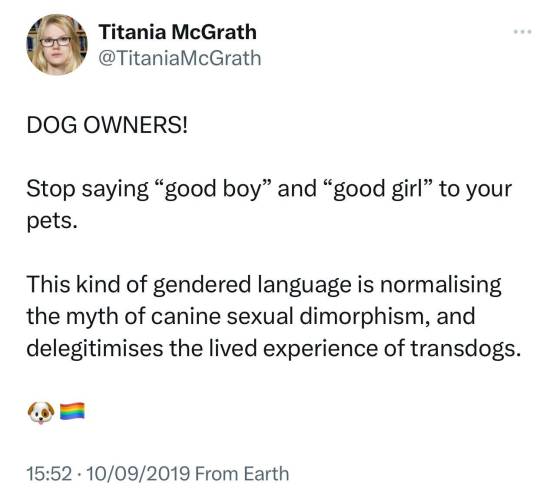
The subsequent outrage ensured that the tweet went viral. And just a couple of months ago, a leading pet talent agency in the UK called Urban Paws was asking owners whether their cats or dogs identified as “gender neutral” or “non-binary”.

After the backlash, the company claimed that it was a mistake. But the specific addition of a “gender identity” category on an application is hardly the equivalent of a typo.
And what about this article on the website of Vet Help Direct?
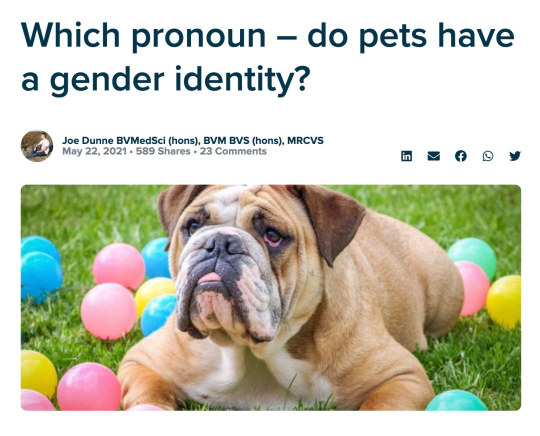
And then of course we have PETA (People for the Ethical Treatment of Animals), the world’s leading animal rights organisation, which posted the following call to arms on Twitter to “end speciesism”:
“Evolve your language. Unlearn how we’ve been taught to think of other animals. They’re NOT an ‘it’ and should never be talked about like objects.”

It’s about time that somebody took a stand for non-binary pigeons.
This is by no means the only example of Titania’s ideas being enacted by woke activists. Here are my top ten examples of when her absurd demands became reality…
On 22 December 2018, Titania called for biological sex to be removed from birth certificates.
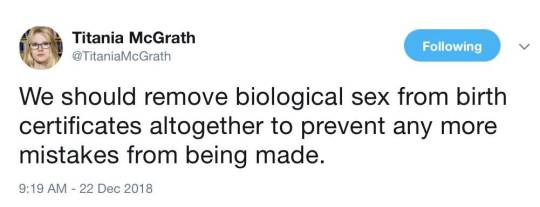
On 17 December 2020, the New England Journal of Medicine concurred.

On 1 October 2019, Titania suggested that young women should be encouraged to travel alone in rural Pakistan.

On 12 October 2019, Forbes Magazine concurred.

On 15 October 2018, Titania argued that Winston Churchill was worse than the Nazis.
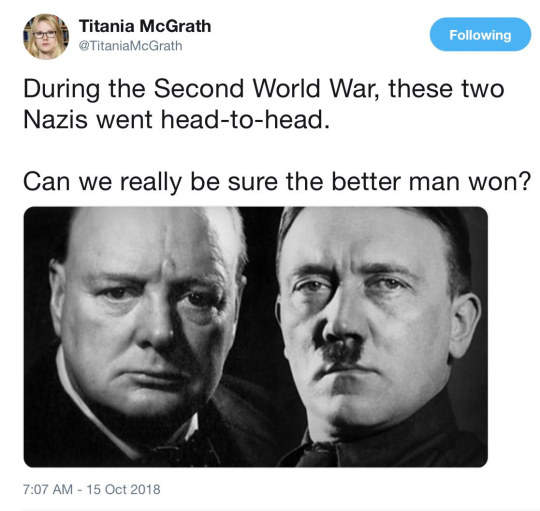
On 11 February 2021, Churchill College at Cambridge University concurred.
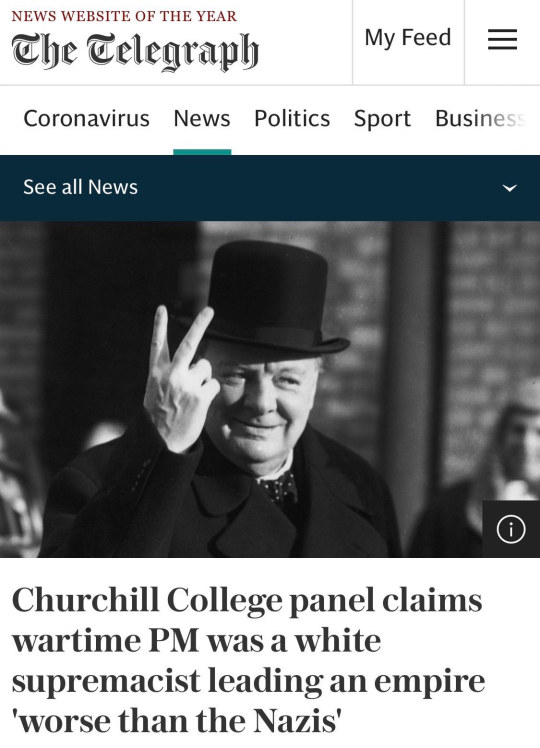
On 19 September 2018, Titania criticised Julie Andrews (aka Mary Poppins) for chimney soot blackface.

On 28 January 2019, the New York Times concurred.
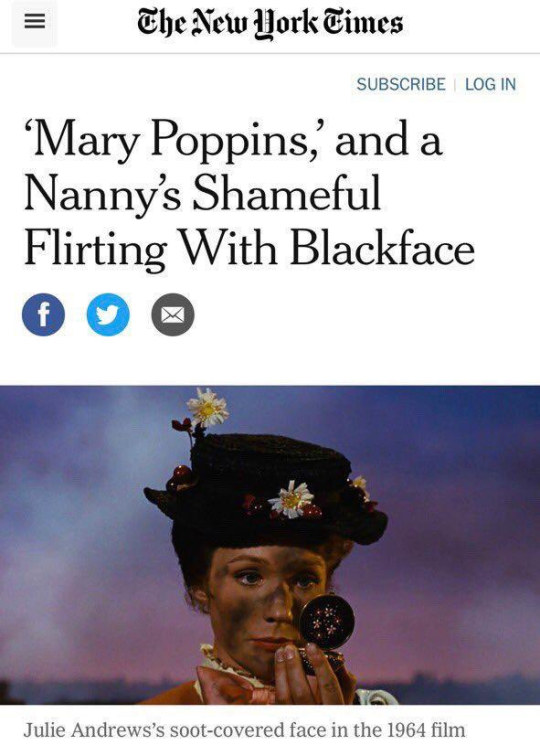
On 29 April 2019, Titania pointed out that scientists have yet to discover the difference between men and women.

On 24 March 2022, USA Today concurred.

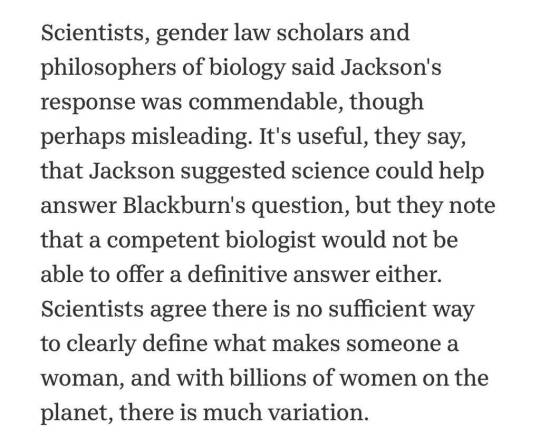
On 22 January 2019, Titania called for the Oscars to prioritise diversity.
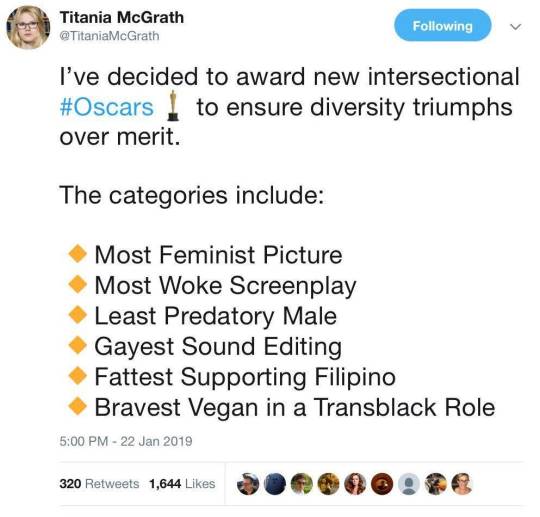
On 12 June 2020, the Academy concurred.
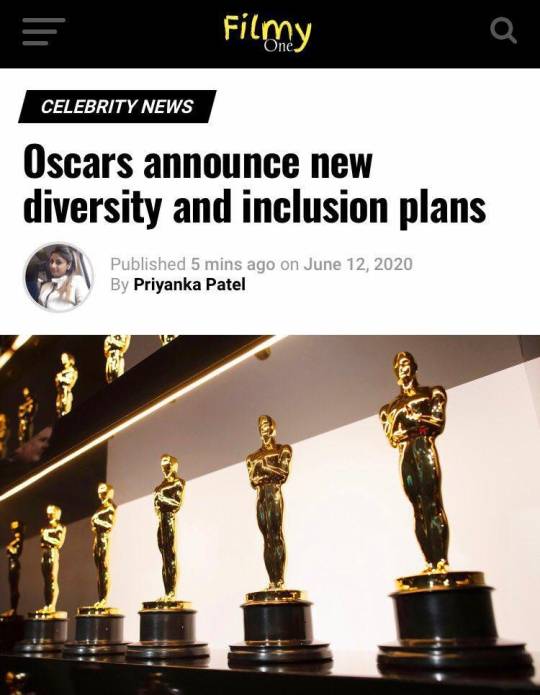
On 30 January 2019, Titania accused Laurence Olivier of a hate crime for his performance as Othello.

On 9 October 2021, the University of Michigan concurred.
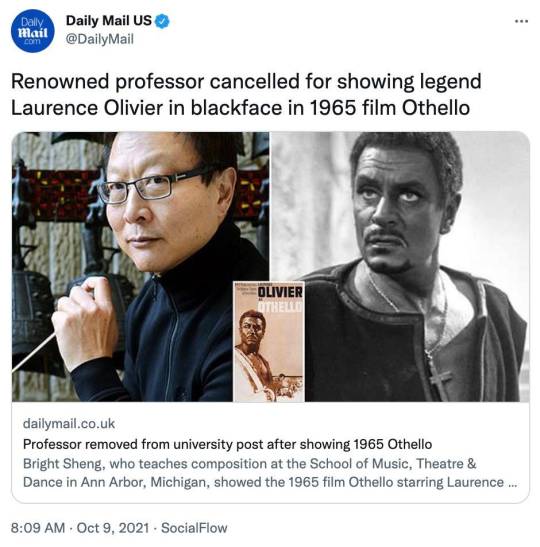
On 2 May 2020, Titania criticised the NHS for appropriating the LGBTQ rainbow flag.

On 6 May 2020, Forbes Magazine concurred.
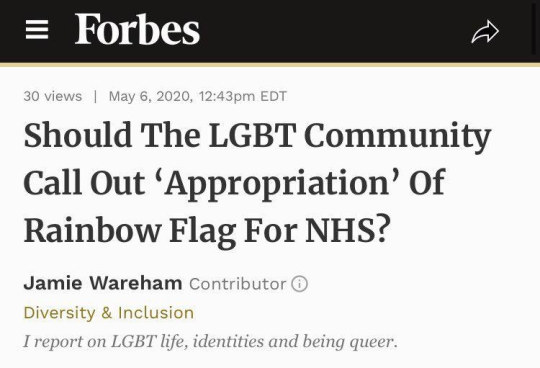
On 6 June 2019, Titania demanded an option on social media to mute white males.
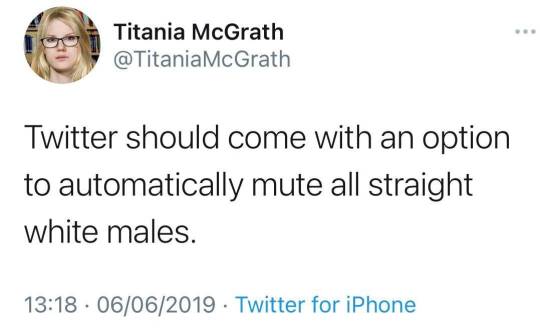
On 14 July 2020, Instagram concurred.

On 12 September 2019, Titania argued that scientists cannot possibly know whether ancient skeletons are male or female.
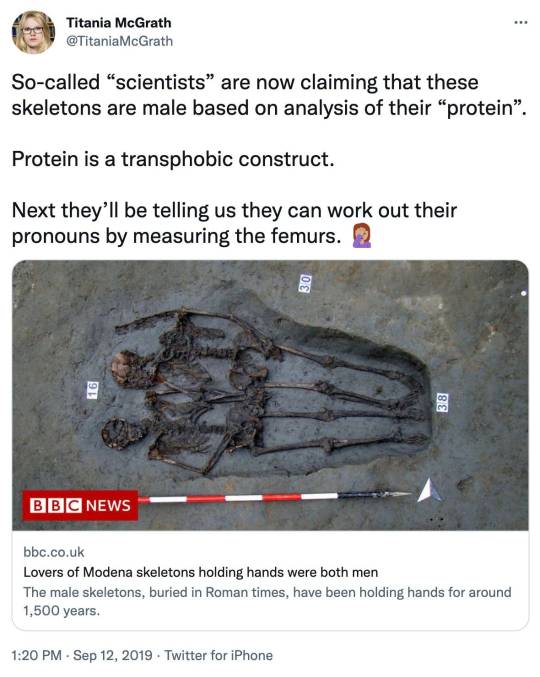
On 18 July 2022, gender activists concurred.
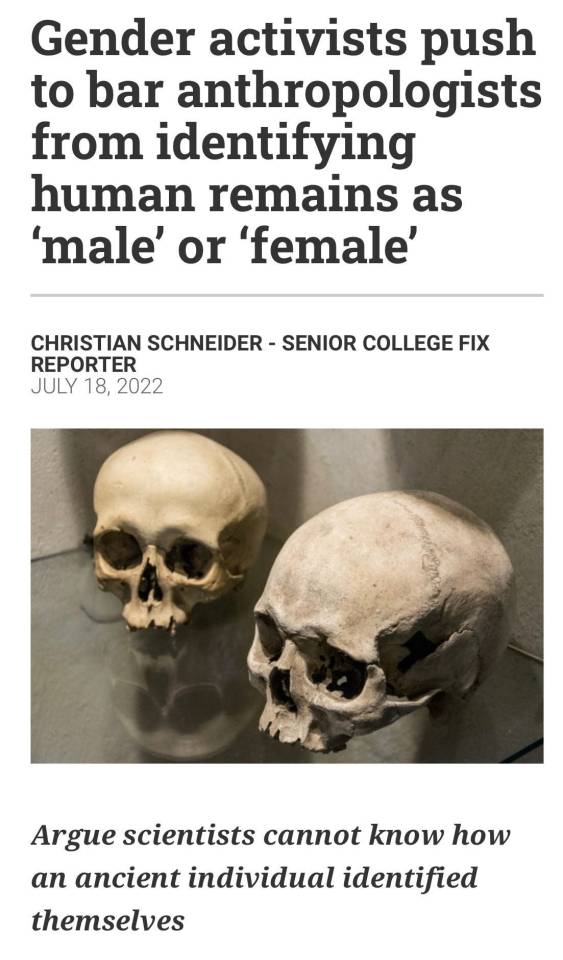
Titania McGrath’s Woke: A Guide to Social Justice is available to buy here. It’s also available on audio book and Kindle.
==
This ideology has become so deranged that it's not possible not parody it anymore. Anything you propose in jest today, they'll take up in sincerity tomorrow. Which shows how performative, directionless and unserious they are.
The Civil Rights and Gay Rights movements had specific aims: eliminate segregation, ensure all laws are race-neutral, that opportunities and resources are available regardless of race, decriminalization of homosexuality, recognition of same-sex partnerships the same as opposite-sex partnerships, including marriage. They were specific, measurable and could be ticked off as they fell.
Woke idiots have no damn clue what they're after. And all they can show us is the stupidest, most petty, most insane non-issues that telegraph to the world they have no real problems to complain about. Elimination of all skyscrapers? A lawsuit over who owns the rainbow? (Fundamentalist Xians would like to get in on that.)
They're just making this crap up as they go along, fighting for who can be the most offended and screaming about their imaginary hurt feelings to garner attention and control.
Why did we ever pay attention to this lunatics?
#Andrew Doyle#Titania McGrath#parody#feminism#intersectional feminism#parody account#LOL#funny#woke#Poe's law#wokeness#cult of woke#wokeism#wokeness as religion#victimhood#victimhood culture#religion is a mental illness
15 notes
·
View notes
Text
The poem "Equality" explores the universal desires for justice and fairness among of all individuals in our society. This poem is written by Maya Angelou, this old women was an american memoirist, poet, and civil rights activist. This poem was published in 1990, she wrote this poem to address how black women are seen and treated in the eyes of men, and calls for a gender and racial inequality, and she wants everyone to know the importance of seeking equality for all.
Furthermore, the poem highlights the social and economic divisions that sustain inequality. It strongly describes the differences in wealth and privilege among the various individuals, the old woman encounters. These differences play a significant role in people's ability to recognize the need for equality. The poem tell us that those in positions of power and has the privilege may be less inclined to feel the importance for change.
Finally, the poem leaves the readers with a sense of hope and possibility. As the old woman continues her search, she has the line of "Take the blinders from your vision, take the padding from your ears, and confess you've heard me crying, and admit you've seen my tears" in that lines it indicates that don't be a deaf and don't be blind as if you should not seen my tears and don't be numb about the feelings of others because we're just the same.
In conclusions, the poem "Equality" serves as a powerful commentary on the universal desire for fairness and justice. Through it's exploration of societal divisions, and the importance of empathy, the poem challenges readers to recognize their role creating and equal world. The poem said that all of us are needed the fairness and equality.
1 note
·
View note